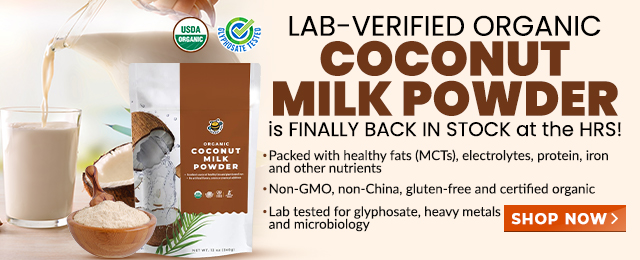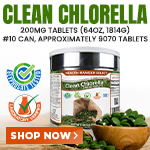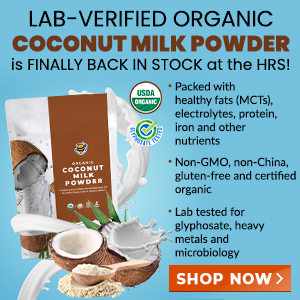
Seven reasons you should eat organic
Monday, August 27, 2012 by: J. D. Heyes
Tags: organic food, farming, benefits
- Newly released JFK files reveal Pentagon's role in creating Lyme disease and covid in the same lab
- Oncologist warns of ‘terrifyingly aggressive’ cancers in children, linked to immune suppression from COVID vaccines
- Trump administration CUTS FUNDING to Gavi, the Vaccine Alliance - a major blow to the Bill Gates-backed entity
- NIH study, buried for decades, reveals that Flu Shots INCREASE elderly deaths, not prevent them
- Health Ranger Report: Ashton Forbes discusses TELEPORTATION ORBS and their role in MH370 disappearance
- Musk targets “strangely wealthy” lawmakers in DOGE probe, names Pelosi, McConnell, Schumer
- COVID-19 scandal linked to CANCER SURGE: Billionaire researcher sounds alarm
- Millionaire fitness coach charged in Tesla vandalism incident as anti-Musk attacks escalate
- EPA banned chemical linked to cancer, Parkinson's and fatal heart defects in babies - now industry is lobbying to get it reinstated
- “Ethically sourced” human “bodyoids” could usher in a new era of medical exploitation, raising disturbing ethical questions
- Woman contracts WORLD'S DEADLIEST VIRUS after unknowingly being given the WRONG VACCINE
- At least 75 percent of Americans are unknowingly MEDICATED FOR STUPIDITY by fluoridated water – Utah now banning it
- DARPA: The shadowy innovator behind the world’s most advanced military technologies
- Civil war is here – Multiple events, from conservatives being “swatted,” to attacks against Telsa owners, happening across America as Dem politicians are telling supporters to ‘fight in the streets”
- Tackling the rubber waste crisis: Groundbreaking study reveals eco-friendly method to recycle tires
- Ancient kitchen secrets REVEALED: How garlic, ginger and green onions fight cancer and heart disease
- U.K. unveils controversial pandemic preparedness tool: A double-edged sword?
- Homesteading Boom: How families are escaping cities to grow their own food
- Newly released JFK files reveal Pentagon's role in creating Lyme disease and covid in the same lab
- Analysis: The coming economic collapse, a mass uprising and Trump's three secret weapons to halt the growing revolt
- Trump's greatest betrayal so far: Accelerating Middle East wars, silencing dissent, and serving Zionist masters
- CDC finally halts $11 billion COVID funding scam as health officials admit the ‘pandemic’ was a fraud
- The hidden dangers in your kitchen: How cooking methods impact diabetes, cancer and aging
- Kiss Your Genetic Privacy Good-Bye! 23andMe Gets Green Light to Sell Your Intimate Genetic Details to Anyone They Want
- DEADLY DECEPTION: How COVID vaccines increased mortality rates and why authorities hid the truth
- Dr. Suzanne Humphries makes bombshell appearance on Joe Rogan podcast, exposing vaccine industry deception back to POLIOMYELITIS
- Trump nominates VACCINE ZEALOT Susan Monarez to lead the CDC, sidelining RFK Jr.'s reform efforts
- Here are TEN all-natural ways to protect your garden without using harmful chemicals
- Woman contracts WORLD'S DEADLIEST VIRUS after unknowingly being given the WRONG VACCINE
- Senate Democrats deny censorship industrial complex existed, defend government's role in silencing dissent
- Black cumin seed oil emerges as a powerful ally against breast cancer and chronic inflammation
- Sugar-free deception: Artificial sweeteners hijack hunger signals, fuel obesity epidemic, study warns
- “Independent” anti-Russia outlet MEDUZA faces COLLAPSE as US funding dries up
- The Health Ranger releases “Vaccine Zombie” song and music video, using AI-animated zombies for the music video
- Discovery of vast underground city beneath Giza pyramids challenges human history
- Key nodes of Federal Government censorship
- Newly released JFK files reveal Pentagon's role in creating Lyme disease and covid in the same lab
- California's social media censorship law struck down: A victory for free speech or a threat to online safety?
- EPA advisor admits the agency is funneling billions to climate groups ahead of Trump’s return to White House
- The Health Ranger releases “Vaccine Zombie” song and music video, using AI-animated zombies for the music video
- Dr. Mike Yeadon releases 15-minute testimony - WATCH - about genocidal intent of COVID “vaccines”
- Florida takes a stand: DeSantis proposes permanent ban on mRNA vaccine mandates
- “Why we influenced the 2020 elections”: Facebook files reveal the coordinated effort to bury the Hunter Biden laptop story
- Mike Adams releases country western hit single: Goin’ Back in Time is Comin’ Home
- The pandemic as a tool for INDOCTRINATION: Understanding “The Indoctrinated Brain” by Dr. Michael Nehls
- Unpacking the Lies That We’ve Been Fed – new song and music video released by Mike Adams, the Health Ranger
- Mike Adams releases music poetry sensation: A Child of God
- House Intelligence Committee calls for the ARREST and PROSECUTION of Dr. Anthony Fauci
- Rep. Nancy Mace introduces bill to ban biological males from female facilities on federal property
- Michigan sheriff announces criminal investigation into 2020 election crimes, Dominion Voting Systems
- Peter Rost exposes Big Pharma corruption in his book “The Whistleblower: Confessions of a Healthcare Hitman”
- Migrants are taking advantage of recent hurricanes to scam residents and loot their homes
- Sugarcane extract superior to cholesterol-lowering drugs?
- Survival 101: Effective EMF blocking techniques
- Red Cross issues warning to stop blood plasma donations from vaccinated people
- Scientists confirm: GENIUS brain function can be spontaneously unleashed in humans without any apparent cause
- EPA advisor admits the agency is funneling billions to climate groups ahead of Trump’s return to White House
- HYSSOP: What research reveals about the health benefits of this ancient holy herb
- Two containers with completed ballots fall out of truck in Florida
- Fully vaccinated about to see “tsunami” of illness and death, warns virologist
- Global leaders unite to clamp down on “misinformation” with UN-backed Cascais Declaration
- BREAKING: 2025 NDAA authorizes mandatory military draft of WOMEN across America… as Pentagon pursues global NUCLEAR war with both Russia and China at the same time
- Michael Yon warns of a ZIONIST TAKEOVER in Trump’s second administration
- BOMBSHELL: DNA testing kits are a SCAM to develop ethnic-specific bioweapons
- Ozempic and Wegovy weight loss drugs are injectable LIZARD VENOM PEPTIDES that may unleash a devastating wave of organ failure… side effects align with symptoms of SNAKE BITES
- Israeli soldiers accused of even more torture and abuse in the West Bank
- These 13 countries just signed an agreement to engineer a global FAMINE by destroying food supply
- NASA admits that climate change occurs because of changes in Earth’s solar orbit, and NOT because of SUVs and fossil fuels
- RFK Jr. clears key hurdle: Sen. Susan Collins backs controversial HHS nominee, signaling a new era for health policy
- Sermon 30: How Jesus reveals Caesar’s FAKE CURRENCY and FALSE AUTHORITY
- Coriander seeds: Ancient medicine backed by modern science
- Arizona officials claim Maricopa County needs 10-13 days to tabulate results of the election
1. Save the planet. No, it's not just a slogan. Saving soil is a priority because much of it has been, for lack of a better term, over-farmed, and as such, it has been robbed of its nutrients. Still, most of our "soil is alive," according to BodyEcology.com, and rich soil contains plenty of nutrients to grow lots of tasty produce that is free from chemicals and pesticides.
2. Organic farms are more diverse. That's not a cultural statement, but a geological and agricultural description. Organic farms have a much more diverse range of fungi living in the soil, experts say. "Of particular interest were arbuscular mycorrhizae, also known as AMF, in which the fungus penetrates the roots of plants. AMF help the plant to capture minerals and micronutrients from the soil," reports BodyEcology.com. Agricultural experts say routine tilling of the soil, coupled with the constant use of herbicides and pesticides, disrupts the natural - and necessary - fungi. Organic farms, by comparison, preserve the mycelial layer - an intricate web of vegetative fungus, thereby promoting a range of in-soil microbes that contribute to the health of crops.
3. Land and body. Consider organic farming much like the practice of alternative medicine. The latter uses substances and ingredients to heal, based on centuries of use by both ancient and modern peoples, because they are effective. The former depends on the natural composition of soil and earth in order to be the most productive; anything that diminishes or takes away from that composition harms the soil or, at the very least, makes it less productive. The body, like the land, is an ecosystem dependent upon certain elements to thrive and survive. Removing those elements disturbs and affects the survivability of the ecosystem.
4. Healthy soil is happy soil. Like the body, soil needs certain nutrients in order to thrive and, more importantly, in order to produce plants and crops that thrive. A healthy, organic soil serves to nourish what grows in it, often protecting plants from pathogen invasion. Also, healthy soil with a strong mycelial layer will detoxify land from heavy pesticides and metals that rob it of nutrients.
5. Do your body a favor. Organic foods are considered more nutrient-rich than non-organics, researchers have found. So what does that mean for you? For one thing, a better, more nutritious diet means a healthier mind and body, and that will be especially important as we age. Many of us have active lifestyles; organic foods, grown on organic farms, can help us maintain that lifestyle well into our twilight years. Consider what Hippocrates taught in the 5th century B.C.: "Let food be your medicine and medicine be your food."
6. The research proves it. A recent study published in the Journal of Applied Nutrition listed many nutrients that appear to be altered based on how they are farmed. Researchers examined organic apples, pear, potatoes, wheat, and sweet corn, then compared the levels of certain nutrients in relation to the commercially available counterparts produced via modern farming practices. They found that levels of important nutrients - chromium, calcium, magnesium, and others - were many times greater in the organic foods. Similar studies have shown, by comparison, that pesticide use reduces the level of these and other nutrients.
7. Do the cost analysis. Why don't more people eat organic? Well, because in many cases, organic foods can be a little more expensive, and we are all about saving money on our grocery bills when and where we can, especially now, as food prices soar. But consider a cost analysis of your decision: You can pay now or pay later. Studies have shown how the use of pesticides, herbicides and other chemicals in our food production can affect our health over time, and it's the cumulative effects of these chemicals - not the immediate impacts - that rob us of longevity.
Sources:
https://www.naturalnews.com/026266_organic_foods_food.html
https://www.naturalnews.com/025643_food_organic_health.html
Organic food at FETCH.news
Get independent news alerts on natural cures, food lab tests, cannabis medicine, science, robotics, drones, privacy and more.
Take Action: Support Natural News by linking to this article from your website
Permalink to this article:
Embed article link: (copy HTML code below):
Reprinting this article:
Non-commercial use OK, cite NaturalNews.com with clickable link.
Follow Natural News on Facebook, Twitter, Google Plus, and Pinterest
Science News & Studies
Medicine News and Information
Food News & Studies
Health News & Studies
Herbs News & Information
Pollution News & Studies
Cancer News & Studies
Climate News & Studies
Survival News & Information
Gear News & Information
News covering technology, stocks, hackers, and more



"Big Tech and mainstream media are constantly trying to silence the independent voices that dare to bring you the truth about toxic food ingredients, dangerous medications and the failed, fraudulent science of the profit-driven medical establishment.
Email is one of the best ways to make sure you stay informed, without the censorship of the tech giants (Google, Apple, Facebook, Twitter, YouTube, etc.). Stay informed and you'll even likely learn information that may help save your own life."
–The Health Ranger, Mike Adams













































